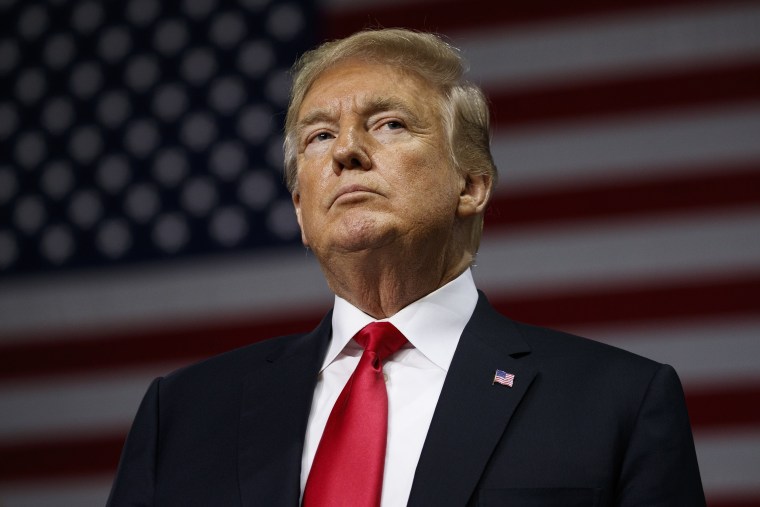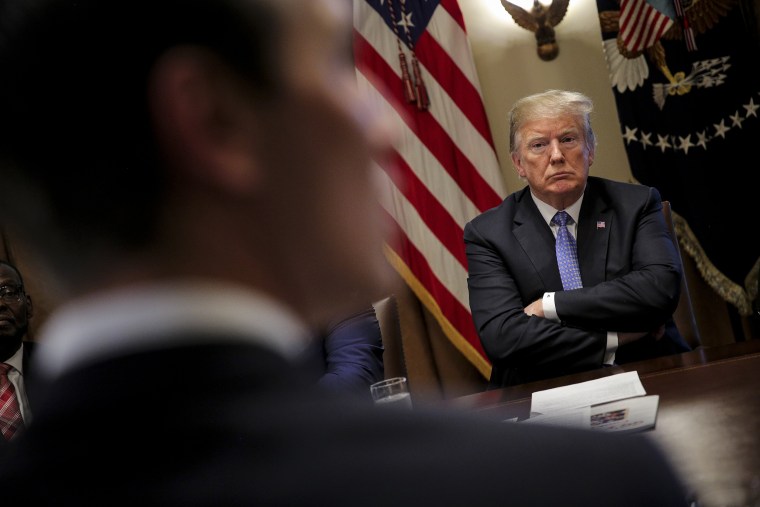There is perhaps nothing more central to candidate and President Donald Trump’s brand than his “tough on immigrants” approach. His attacks on Mexicans and Mexico helped fuel his rise in 2015, and just last week he threatened to shut the government down unless Congress funded his border wall and changed the law to make it easier for him to deport undocumented immigrants.
His message has long been that, of all the challenges facing the country — economy, health care, Russian interference, North Korea — the one that matters most to him is immigration, and the entire government must take action.
His elevation of immigration and border issues to top-tier status is particularly remarkable because, prior to his inauguration, it would have been hard to have made the objective case that America is in the midst of an immigration crisis.
Despite his statements to the contrary, violent crime across the U.S. is half of what it was a generation ago, and immigrants commit crimes at far lower rates than native-born Americans. The big flow of undocumented immigrants into the U.S. ended a decade ago, and there are fewer undocumented immigrants in the U.S. today than there were when George W. Bush was president. Asian Americans, many of whom are immigrants or children of immigrants, outperform whites on many economic measures, and Hispanics are not all that far behind.
And, as Trump often reminds us, the unemployment rate and stock market are in historically positive territory, and median income in the U.S. has been rising for years now. So rather than hurting the economy, all these immigrants seemed to have helped it get to the strong place it is in now.
Looking through the lens of terrorism, things also seem pretty well-managed here. Since 9/11, America has had close to a billion tourists visit the country, and has seen no foreign fighter attacks on our soil. The jihadi attacks we have seen have all been “home grown,” and while tragic, the total number of people killed and wounded in such attacks is only half of the number killed and wounded by a single gunman in Las Vegas last year in just 10 minutes. A report released earlier this year by the Anti-Defamation League found that 71 percent of those killed by extremists in the U.S. over the past decade were killed by white supremacists, with jihadi attacks only making up 26 percent.

A fair look at all this data suggests that, in the years leading up to Trump’s presidency, the U.S. government, working in conjunction with international and domestic partners, got both the threats from foreign terrorism and the flow of unwanted immigrants into the country to a manageable place. A more accurate narrative from the leader would have acknowledged the progress that had been made and identified the problems that remained.
That is wishful thinking, perhaps.
A more accurate narrative from the leader of the country would have acknowledged the progress that had been made, and identified the problems which remained.
The “immigration crisis” the nation now faces is far more a political crisis than a governing one. The hard truth is that there a growing sense that the president’s immigration strategy has failed, and he, like a petulant child, is now lashing out, both threatening to, and taking, extreme measures. Congress has failed to give him his wall and even the Republicans in the Senate rejected the immigration changes he wanted to make. The courts severely scaled back his Muslim ban, blocked his efforts to deport Dreamers and defund “sanctuary cities” and are now forcing him to reunite the kids separated from their parents. Requirements for long-settled immigrants without documentation to have their day in court is preventing him from mass deporting millions, and there is little evidence that millions of undocumented immigrants are “self-deporting” due to the new, far-harsher immigration regime.
But it is what has happened on the border in the past year which poses the greatest political threat to Trump. At the core of his immigration strategy is an effort to create a deep climate of fear through aggressive immigration enforcement. That climate, he and his advisers thought, would encourage undocumented immigrants here in the country to voluntarily leave (“self-deport,” in the parlance) saving the government a great deal of money and effort, and deter new arrivals from coming.
And, in Trump’s first few months after this election, the number of people attempting to come into the country without authorization at the border dropped significantly, as did, incidentally, the number of tourists and foreign student applicants into the U.S. So there was evidence his strategy was working, and thus the other legal and legislative setbacks could be tolerated.
Then, starting in the summer of 2017, people started coming to the border in higher numbers again. By December, monthly apprehensions at the border were almost three times what they were in April. Even though all that was really happening was a reversion to the normal monthly flows, for Trump these increases meant he could no longer say this policies were deterring people from coming. The very human desire for a better life was trumping Trump’s policy of fear. And that was a crisis indeed for the president.
So the National Guard was mobilized; military judges were sent to the border to expedite deportations; a policy of separating kids from their parents was instituted along with other, likely illegal, changes to how we handled incoming migrants. These changes have created a true national crisis — a moral crisis, a legal crisis, a governing crisis — that he is now trying to use to force dramatic change.
That is the crisis to which the president is really referring when he says he doesn’t care about the political fallout of his immigration policies. What he is saying is that, even if it harms children, causes him to lose the election, violates the law and is contrary to common decency, he is going ahead with his immigration policy because it is important to him — not for the nation, but for him.
For without success on immigration on his terms — if he has to compromise and settle — then what is he? The international anti-migrant movement he is attempting to establish and lead, the Trump brand even, is nothing without xenophobia, exploitation of racial fear and kids in cages.
Compromise on immigration may even be worse than nothing, for all the Trump brand then becomes is tax cuts for the wealthiest among us and little for everyone else, stripping health care from tens of millions, banana republic levels of debt, super swampy corruption and fealty to a foreign leader instead of America First. It is everything that Trump told his voters that they weren’t going to get.
The very real crisis the nation now faces is that the changes the president wants would give the very people who have created this humanitarian crisis on the border — his White House and Department of Homeland Security — unfettered powers to remove people from the U.S. without due process. Given Trump’s own disregard for immigrants (“animals,” he’s called some of them), rule of law and his broader illiberal impulses, putting that kind of power in the hands of a highly politicized law enforcement agency while he is president would be a betrayal of the American creed and something no responsible leader should ever even consider.
So we are at a stalemate and there is no easy way out here. The more the president fails to achieve or is denied something so core to his brand, the more prone he will be to do outrageous things to address it or deflect from his failings. The failure of his immigration policies is a failure of Trumpism itself. So, frighteningly, kids in cages and a government shutdown may not be the worst of what is to come from this dark and troubled man in the months ahead.
Simon Rosenberg is the President of NDN, a center-left think tank in Washington, D.C. He has worked on issues involving globalization and the post WWII order for over 25 years.



